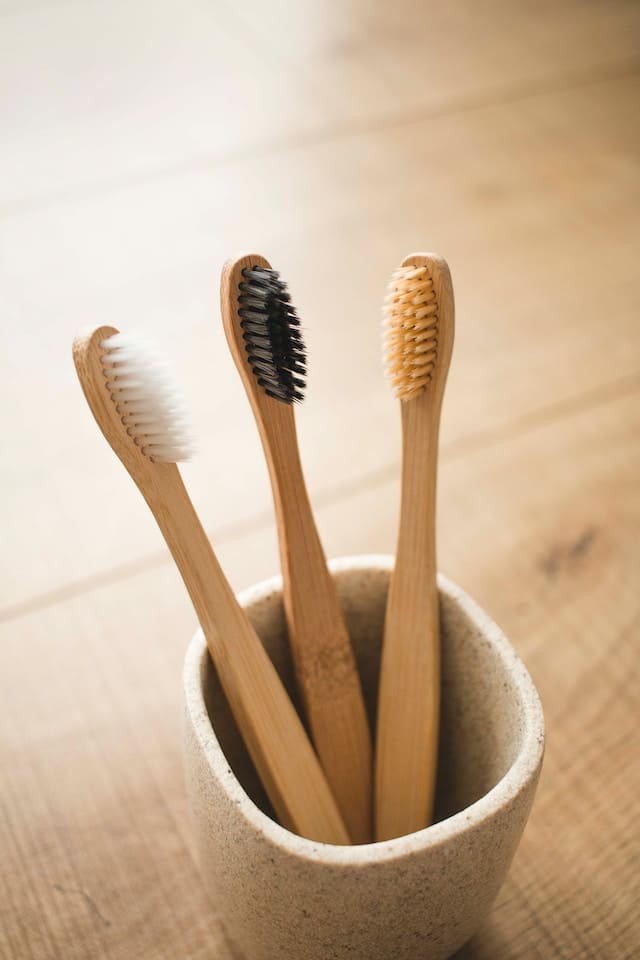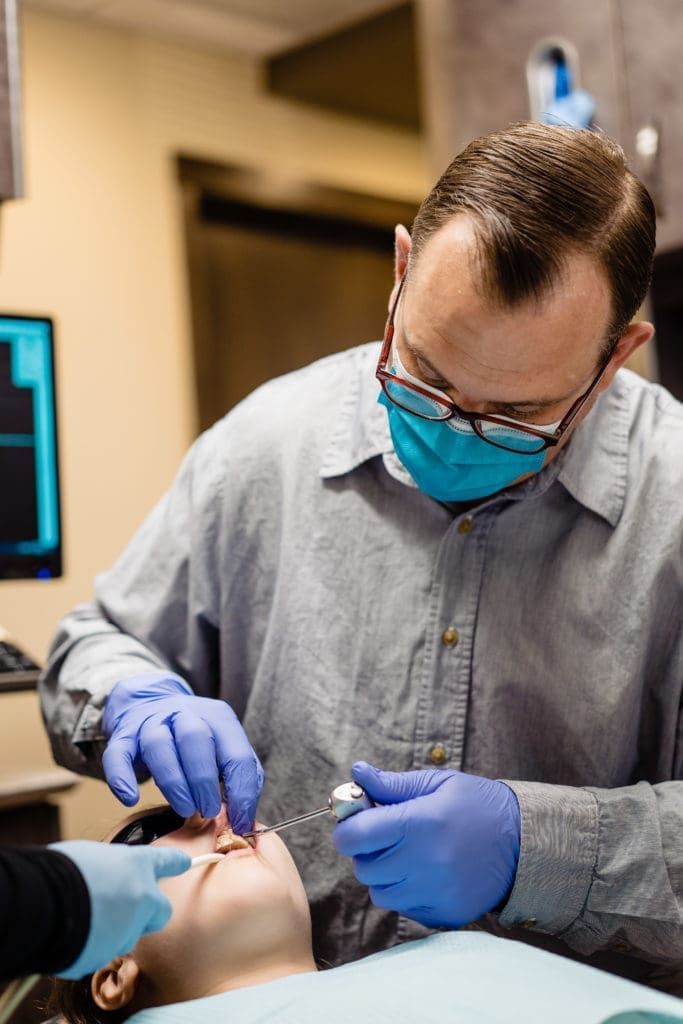Have you ever brushed your teeth meticulously, only to ask yourself, “Why does my breath smell bad even after brushing?” You’re not alone in this battle. This common conundrum leaves many scratching their heads, wondering why their oral hygiene efforts seem to fall short when keeping their breath fresh.
It’s a puzzling situation: you brush, you floss, and yet, the unpleasant odor lingers. This persistent bad breath, often medically termed as halitosis, can be more than just an annoyance; it can be a source of embarrassment and frustration. But here’s the thing – it’s not always about what you’re doing but what you might be missing or what’s happening beneath the surface.
Tackling this issue requires a detective’s eye. It’s about delving deeper than your toothbrush bristles can reach. From the foods you eat to the less obvious culprits lurking in your mouth or even beyond, several factors could be playing a role. Understanding these can be the key to unlocking fresher breath and a more confident smile.

What is Halitosis?
Halitosis, commonly known as bad breath, is more than just an occasional nuisance after eating strong-flavored foods or waking up in the morning. It’s a chronic condition where the breath consistently emits an unpleasant odor. This persistent issue can stem from various sources, primarily involving the mouth’s environment.
At its core, halitosis often arises from the presence and activities of bacteria in the mouth. These bacteria, feeding on food particles left in the mouth, produce sulfur compounds that lead to the foul smell associated with bad breath. However, it’s not solely a bacterial issue. Factors like dry mouth, gum disease, and even certain medical conditions outside the oral cavity can contribute to halitosis.
Common Myths About Bad Breath and Oral Hygiene
When it comes to bad breath and oral hygiene, there’s a lot of information out there, but not all of it holds water. Let’s bust some common myths and set the record straight, so you can focus on what works in keeping your breath fresh.
Myth 1: Bad Breath Means Poor Brushing
It’s easy to think that bad breath is a sure sign of poor brushing habits. While oral hygiene is crucial, bad breath can persist even for those who brush diligently. Factors like diet, dry mouth, or internal medical conditions can also lead to halitosis.
Myth 2: Mouthwash Fixes Everything
Many believe a quick swish of mouthwash is the cure-all for bad breath. While mouthwash can temporarily freshen breath, it often masks the problem rather than solving it. For chronic bad breath, the solution usually lies deeper than what mouthwash can reach.
Myth 3: Chewing Gum is as Good as Brushing
Chewing gum, especially sugar-free, can freshen your breath and even help clean your teeth to an extent. However, it’s not a substitute for brushing and flossing. Gum can’t remove plaque and bacteria as effectively as a toothbrush and floss.
Myth 4: If You Can’t Smell Your Breath, It’s Fine
Many people think if they can’t smell their breath, it isn’t bad. The truth is, it’s challenging to detect your breath odor. It’s better to maintain good oral hygiene and have regular dental check-ups than to rely on self-assessment.
By understanding what truly causes and affects bad breath, you can take more effective steps to combat it. Remember, good oral hygiene is key, but it’s also important to look at the bigger picture of your overall health and habits.
Common Culprits Behind Persistent Bad Breath
Persistent bad breath often has a few usual suspects lurking behind it, and it’s not just about skipping the toothbrush. Food particles remaining in the mouth can be a feast for bacteria, leading to foul-smelling odors. Poor oral hygiene is another key player; if brushing and flossing aren’t part of your daily routine, or if they’re not done effectively, bad breath can be a stubborn companion. Then there’s the often-overlooked dry mouth; without enough saliva to wash away food particles and bacteria, your mouth becomes a prime spot for bad odors. And let’s not forget lifestyle choices like smoking or dietary habits, which can also contribute significantly to this issue.
How Do Food Choices Impact Your Breath?
The connection between what we eat and the freshness of our breath is more significant than many realize. Certain foods and dietary habits can be major contributors to bad breath, and understanding this can help you make smarter choices for fresher breath.
- Odor-Inducing Foods: It’s common knowledge that foods like garlic and onions can leave your breath less than fresh. These foods contain compounds that, once digested, enter your bloodstream and are carried to your lungs, affecting your breath until they are completely metabolized.
- Sticky and Sugary Foods: Foods that stick to your teeth or are high in sugar can also be problematic. They provide a feast for the bacteria in your mouth, which produce foul-smelling waste as a byproduct.
- Low-Carb Diets: Diets low in carbohydrates can lead to a condition called ketosis, where your body burns fat for energy. This process produces chemicals called ketones, which can cause your breath to smell.
- Acidic Beverages and Coffee: Drinks like coffee and acidic beverages can alter the pH balance in your mouth, making it more conducive to bacterial growth and bad breath.
Incorporating a balanced diet and being mindful of these food-related factors can play a significant role in maintaining fresh breath. It’s not just about avoiding certain foods but also about ensuring a healthy, varied diet that supports overall oral health.
Can Poor Oral Hygiene Be the Root Cause of Persistent Bad Breath?
When it comes to the battle against bad breath, the role of oral hygiene cannot be overstated. Improper or inadequate brushing and flossing are often key culprits behind those lingering odors. Let’s delve into how neglecting oral care can lead to this unwelcome outcome.

- Plaque Build-Up: Ineffective brushing leaves plaque, a sticky film of bacteria, on your teeth and gums. This plaque harbors bacteria that produce odors, leading to persistent bad breath.
- Trapped Food Particles: Without thorough brushing and flossing, food particles can get trapped in your teeth and gums. These particles decay over time, contributing to foul smells.
- Tongue Neglect: The tongue can be a hotspot for bacteria. Neglecting to clean your tongue regularly can result in a build-up of compounds that emit unpleasant odors.
- Gum Disease: Inadequate oral hygiene can lead to gum disease, another significant contributor to bad breath. Infected gums create a breeding ground for odor-causing bacteria.
In essence, maintaining good oral hygiene is crucial in keeping bad breath at bay. Regular brushing, flossing, and tongue cleaning are fundamental practices to eliminate the bacteria and food particles that cause bad odors. Remember, a clean mouth is a fresh-smelling mouth!
How Does Dry Mouth Lead to Persistent Bad Breath?
Dry mouth, medically known as xerostomia, plays a more significant role in bad breath than many might realize. Even after thorough brushing, if your mouth is dry, you might still find yourself grappling with bad breath. Let’s explore why this happens and how a lack of saliva contributes to this issue.
- Saliva: Nature’s Mouthwash: Saliva is crucial in maintaining oral health. It washes away food particles and neutralizes acids produced by bacteria, minimizing their growth and the resulting bad breath.
- The Consequences of Reduced Saliva:
- Bacterial Buildup: With less saliva, bacteria can thrive, leading to an increase in the volatile sulfur compounds that cause bad breath.
- Food Particles Remain: Without enough saliva to rinse them away, food particles linger in the mouth, decomposing and contributing to unpleasant odors.
- Acidic Environment: A dry mouth can become more acidic, creating an environment where odor-causing bacteria flourish.
Why Dry Mouth Persists After Brushing:
Brushing your teeth, while essential, doesn’t always address the root cause of dry mouth. If saliva production is low, brushing alone may not be enough to remove all the bacteria and food particles that cause bad breath.
Understanding the impact of dry mouth on bad breath is crucial. It’s not just about keeping your mouth moist; it’s about ensuring a healthy balance in your oral environment. Staying hydrated, using saliva substitutes, and discussing any persistent dry mouth issues with your dentist can help keep your breath fresher and your mouth healthier.
How Do Tobacco Products Affect Oral Health and Breath Odor?

The impact of smoking and using tobacco products on oral health and breath is profound and multifaceted. While most are aware of the general health risks associated with tobacco, its specific effects on oral hygiene and breath odor are equally significant and warrant a closer look.
- Direct Impact on Breath: Tobacco products inherently have strong odors that linger in the mouth and on the breath. These odors are not easily masked by brushing or mouthwash and can persist long after the tobacco use.
- Reduced Saliva Flow: Smoking and tobacco use can lead to a decrease in saliva production. As we’ve learned, saliva is crucial for neutralizing and washing away food particles and bacteria, which, when reduced, can lead to bad breath.
- Increased Risk of Gum Disease: Tobacco use is a significant risk factor for gum disease, a leading cause of bad breath. It affects the attachment of bone and soft tissue to your teeth, creating pockets where odor-causing bacteria can thrive.
- Staining and Decay: Tobacco can stain teeth and fillings, contributing to decay. Decayed teeth and deteriorating dental work are breeding grounds for bacteria, adding to the problem of bad breath.
In essence, the use of tobacco products has a direct and detrimental impact on oral health and breath odor. Quitting tobacco use can significantly improve oral health and the freshness of your breath, along with providing numerous other health benefits. For those struggling with tobacco-related oral health issues, seeking professional dental care and support for quitting tobacco can be crucial steps towards better oral hygiene and overall health.
Less Known Factors about Bad Breath
Beyond the usual suspects like poor oral hygiene and diet, there are less known factors that can contribute to bad breath, often lurking unnoticed. Medical conditions such as sinus infections, diabetes, and gastrointestinal issues can be stealthy culprits, affecting your breath in ways that brushing alone can’t fix. Medications too play a role; some can cause dry mouth or other side effects that indirectly lead to bad breath. It’s important to consider these underlying factors, as they might require more than just dental solutions. Addressing these less obvious causes can be a key step in your journey to fresher breath and overall better health.
Can Medical Conditions Be Behind Your Bad Breath?
When tackling the issue of bad breath, it’s crucial to look beyond oral hygiene and consider the possibility of underlying medical conditions. Certain health issues can play a significant role in causing bad breath, often in ways that aren’t immediately obvious.
- Sinus Infections: These can lead to postnasal drip, a condition where mucus accumulates at the back of the throat, creating an ideal environment for bacteria to flourish, resulting in foul-smelling breath.
- Diabetes: People with diabetes, especially when poorly controlled, can experience a condition known as ketoacidosis. This leads to the production of ketones, which have a distinct and often unpleasant odor that can affect breath.
- Stomach Issues: Conditions like acid reflux or other gastrointestinal problems can contribute to bad breath. The reflux of stomach acids can bring up food particles and odors back into the mouth and esophagus.
Understanding the link between these medical conditions and bad breath is essential. It highlights the importance of a holistic approach to diagnosing and treating bad breath, one that considers your overall health, not just your oral hygiene practices. If you suspect your bad breath might be linked to a medical condition, it’s important to consult with healthcare professionals to address the root cause effectively.
How do Certain Medications Contribute to Bad Breath?
When exploring the causes of bad breath, it’s important to consider the medications you’re taking, as they can sometimes play an unexpected role. Various medications have side effects that can indirectly lead to bad breath, often through the condition known as dry mouth or xerostomia.
- Dry Mouth as a Side Effect: Many medications, including antihistamines, decongestants, painkillers, and high blood pressure medications, can reduce saliva production. Saliva is essential for neutralizing acids and washing away food particles and bacteria. A reduction in saliva can lead to an increase in bacteria and, consequently, bad breath.
- Other Side Effects: Some medications can release chemicals that can be carried to your breath, altering its smell. Others might affect your digestion, leading to gastrointestinal issues that contribute to bad breath.
Understanding the connection between your medications and oral health is crucial. If you’re experiencing persistent bad breath and are on medication, it might be worth discussing with your doctor or dentist. They can help determine if your medication is a contributing factor and suggest alternatives or additional treatments to mitigate the effects. Remember, managing bad breath effectively sometimes requires looking at the bigger picture of your overall health and medication regimen.
What Are the Best Strategies for Effectively Tackling Bad Breath?
Effectively tackling bad breath involves a multifaceted approach that goes beyond just regular brushing and flossing. Good oral hygiene is the foundation – ensuring you brush twice a day, floss daily, and clean your tongue to remove bacteria and food particles. Staying hydrated is key, as it helps maintain saliva flow, crucial for neutralizing bad breath. Incorporating a balanced diet and avoiding foods known to cause bad odors can also make a significant difference. For those with dry mouth, using saliva substitutes or chewing sugar-free gum can be beneficial. And importantly, regular dental check-ups are essential to address any underlying dental issues contributing to bad breath.
Enhancing Your Oral Hygiene: Key Tips for Fresher Breath
Improving your oral hygiene routine is crucial in the fight against bad breath, and it’s more about technique and consistency than just brushing and flossing more often. Here’s how you can make your oral care routine more effective:
- Brushing Techniques:
- Brush for at least two minutes, twice a day, ensuring you reach all areas of your mouth.
- Hold your toothbrush at a 45-degree angle to your gums to effectively clean along the gum line.
- Don’t overlook your tongue; bacteria here can contribute to bad breath. Use a gentle brushing motion or a tongue scraper.
- Flossing Fundamentals:
- Floss daily to remove food particles and plaque between teeth where a toothbrush can’t reach.
- Use a proper flossing technique: Gently curve the floss around each tooth and slide it beneath the gum line.
- Rinse Right:
- Incorporate an antibacterial mouthwash into your routine to reduce bacteria and freshen your breath. Remember, mouthwash is an addition to, not a replacement for, brushing and flossing.
By honing your brushing and flossing techniques and ensuring a comprehensive approach to oral hygiene, you can significantly improve the freshness of your breath. Effective oral hygiene is about the quality of your routine and doing it consistently.
Staying Hydrated: How Water Plays a Crucial Role in Oral Health and Fresh Breath

Keeping well-hydrated is a simple yet often overlooked aspect of maintaining oral health and ensuring fresh breath. Water isn’t just vital for overall health; it has specific benefits for your mouth that are worth highlighting.
- Natural Mouth Cleanser: Water acts as a natural cleanser, washing away food particles and bacteria that can lead to bad breath. It’s like a gentle, continuous cleaning system for your mouth.
- Saliva Production: Staying hydrated helps maintain adequate saliva production. Saliva is essential in neutralizing acids produced by bacteria and in preventing dry mouth, a common cause of bad breath.
- Fights Dry Mouth: Regular water intake combats dry mouth, keeping your oral environment balanced and less hospitable to odor-causing bacteria.
- Dilutes Sugary Substances: Drinking water, especially after consuming sugary or acidic foods and drinks, can help dilute their harmful effects on your teeth and gums.
Incorporating plenty of water into your daily routine is a simple yet effective way to support your oral hygiene efforts. It complements your brushing and flossing routine, helping to keep your mouth clean, your breath fresh, and your teeth and gums healthy. Remember, a hydrated mouth is a happy mouth!
The Importance of Regular Dental Visits for a Healthy Smile
Regular dental visits are a cornerstone of maintaining not just overall oral health but also in ensuring your breath stays fresh. Professional cleanings and check-ups play a pivotal role in preventing and addressing the causes of bad breath.
- Professional Cleanings: These sessions go beyond what you can achieve with your toothbrush and floss at home. Dental hygienists remove plaque and tartar build-up, particularly in hard-to-reach areas, reducing the potential for bad breath caused by bacteria.
- Early Detection of Issues: Regular check-ups allow your dentist to spot and address issues like gum disease, dry mouth, or other dental problems that can contribute to bad breath. Catching these issues early can prevent them from becoming more serious.
- Personalized Advice: Your dentist can provide tailored advice on improving your oral hygiene routine based on your specific needs. This might include recommendations for specific products or techniques to address your bad breath concerns.
Incorporating regular dental visits into your healthcare routine is essential for keeping your mouth healthy and your breath fresh. These visits are not just about checking for cavities; they’re an opportunity to ensure that your entire mouth, including your breath, is in the best possible condition. Remember, a proactive approach to dental care is key to maintaining a fresh, healthy smile.

Making Dietary Adjustments to Combat Bad Breath
Your diet plays a significant role in the freshness of your breath. Certain foods and eating habits can contribute to bad breath, while others can help combat it. Making mindful dietary adjustments can be a key strategy in maintaining fresh breath.
- Reduce Odor-Inducing Foods: Foods like garlic, onions, and certain spices, while delicious, can contribute to bad breath. Reducing their intake, especially before social events or professional meetings, can help keep your breath fresher.
- Increase Water Intake: Drinking plenty of water helps wash away food particles and bacteria, the primary culprits of bad breath. It also aids in saliva production, which is essential for neutralizing bad odors.
- Eat Crunchy Fruits and Vegetables: Crunchy, fresh fruits and vegetables like apples, carrots, and celery can help clean your teeth naturally as you eat them and stimulate saliva flow.
- Include Natural Breath Fresheners: Foods like parsley, mint, and fennel seeds are natural breath fresheners. Including them in your diet can help combat bad breath.
- Limit Sugary Foods and Drinks: Sugar is a favorite food for bacteria in your mouth, leading to bad breath. Reducing sugary foods and beverages can decrease bacterial growth and bad breath.
By incorporating these dietary adjustments, you can take a proactive approach to managing bad breath. It’s not just about avoiding certain foods but also about including those that can help maintain oral health and fresh breath. Remember, a balanced diet is not only good for your body but also beneficial for your oral health and breath freshness.
Recognizing When It’s Time to Seek Professional Help for Bad Breath
While many cases of bad breath can be managed with good oral hygiene and lifestyle changes, there are times when it’s crucial to seek professional help. Persistent bad breath can sometimes be a sign of underlying health issues that require a dentist’s attention.

- Chronic Bad Breath: If your bad breath persists despite your best efforts with improved oral hygiene, hydration, and dietary changes, it’s time to consult a professional. Chronic bad breath could be a sign of more serious dental issues like gum disease or tooth decay.
- Accompanying Symptoms: Look out for other symptoms such as tooth pain, bleeding gums, or a persistent dry mouth. These could indicate dental health problems contributing to your bad breath.
- Medical Conditions: If you have existing medical conditions like diabetes, gastrointestinal issues, or respiratory infections, and you notice a sudden change in your breath odor, a visit to your doctor is advisable. Bad breath can sometimes be a side effect or symptom of these conditions.
- No Obvious Cause: If you can’t pinpoint a cause for your bad breath, such as dietary habits or poor oral hygiene, professional evaluation can help uncover hidden issues.
In these scenarios, a dentist can provide a thorough examination, diagnose the underlying cause, and recommend appropriate treatment. Remember, bad breath isn’t just a cosmetic issue; it can be a window into your overall health, and addressing it promptly can lead to better health outcomes.
Navigating the complexities of bad breath can be challenging, but it’s a journey well worth taking for the sake of your oral health and overall well-being. Remember, maintaining good oral hygiene is the cornerstone of fresh breath. Regular brushing, flossing, and mindful dietary choices, along with staying hydrated, are your first line of defense against bad breath. However, it’s equally important to recognize when professional help is needed.
Persistent bad breath can sometimes be a sign of underlying health issues, and addressing these early can make a significant difference. Don’t hesitate to seek professional advice if you’re facing ongoing challenges with bad breath. A dentist can provide a thorough examination, identify any underlying causes, and offer tailored treatment options.
Take the Next Step with Thomas Dentistry
If you’re struggling with persistent bad breath or just looking for ways to improve your oral health, Thomas Dentistry is here to help. Our team of experienced professionals is committed to providing personalized care and effective solutions. Schedule a consultation with us to receive personalized advice and explore treatment options that cater to your specific needs. Let us help you achieve the fresh breath and healthy smile you deserve.
